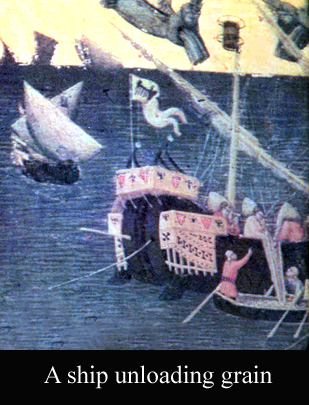Catalan involvement in the Mahgreb
was enough to create conflict with Angevin interests, but several
factors pushed the Crown of Aragon toward involvement in Sicily. Despite
the turmoil following the death of Frederick II, Sicily was still a major
 grain producer for the region, which with its strategic location, made it
an attractive target for Aragon and Catalonia, both of which had
difficulty meeting demands for basic food items. The problem was so
serious that in 1271 James I had prohibited the export of grains and
vegetables. Peter III rescinded part of the decree a decade later, but not the section
concerning grain export. Control
of Sicily had economic benefits for the Crown of Aragon. The island could
provide grain for the Iberian kingdom. It would also give the Catalan
merchant community control of the lucrative trade passing through the
island and place them in a position to dominate the Mahgreb.
grain producer for the region, which with its strategic location, made it
an attractive target for Aragon and Catalonia, both of which had
difficulty meeting demands for basic food items. The problem was so
serious that in 1271 James I had prohibited the export of grains and
vegetables. Peter III rescinded part of the decree a decade later, but not the section
concerning grain export. Control
of Sicily had economic benefits for the Crown of Aragon. The island could
provide grain for the Iberian kingdom. It would also give the Catalan
merchant community control of the lucrative trade passing through the
island and place them in a position to dominate the Mahgreb.
Probably the most telling evidence for the Crown of Aragon's reasons for involvement in Sicily is the use the crown made of the island once it gained control. Peter and his successors exploited Sicily's strategic location to impose their will on the Mahgreb and reinstate the yearly tribute, to funnel a substantial portion of the grain to Catalonia, and to feed the fleet that was enforcing the crown's policies. The export taxes from the island also fattened the treasury. Peter III was undoubtedly driven by dynastic considerations, but he and his successors understood the strategic importance of the island. Control of Sicily meant control of trade in the Western Mediterranean. Their support and use of the fleet demonstrates that they understood that advantage very well. The crown may not have had an all-encompassing strategic plan when the expansion into the Mediterranean began, but, by the reign of Peter III, the value of Sicily was not lost on the court or the Catalan merchant community. Thus, the crown had every reason to become involved and few incentives for leaving Sicily to the Angevins.


